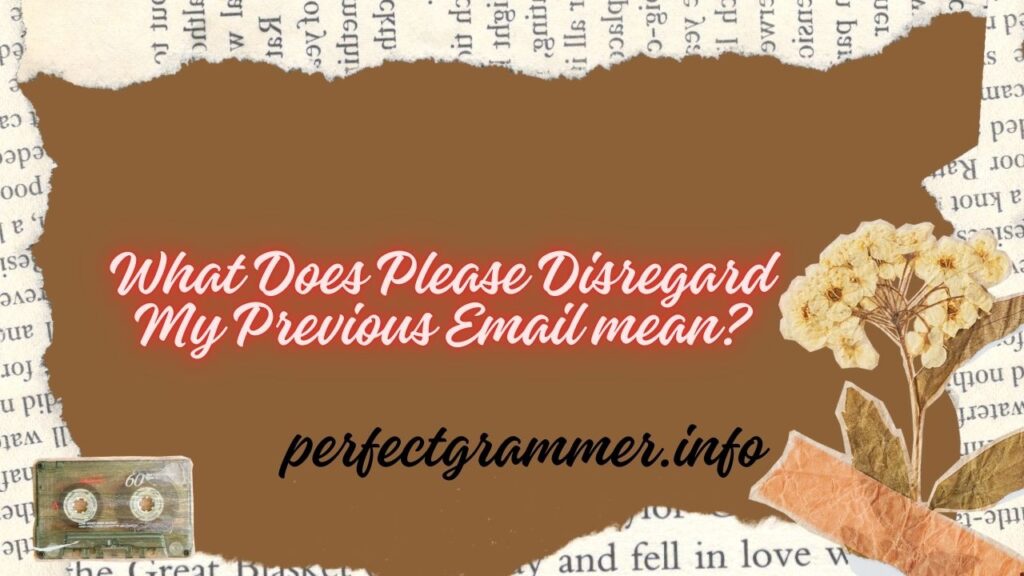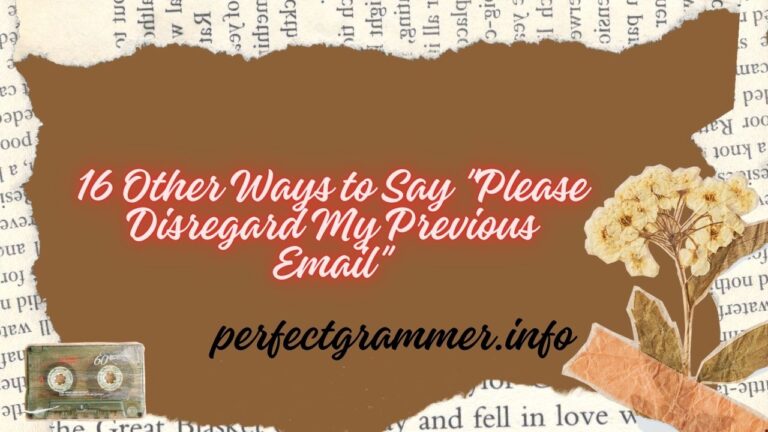Sometimes, we send emails by mistake and need to correct them. Instead of saying “Please disregard my previous email,” you can use different phrases. Try “Ignore my last email,” or “Kindly overlook my previous message.”
If you need to be formal, say “Please consider my last email null and void.” For urgent cases, “Forget my earlier email, I’ll send an update soon” works well. Choosing the right phrase depends on the situation and your audience.
What Does Please Disregard My Previous Email mean?

“Please disregard my previous email” means to ignore or not consider the last email sent. It is used when the email contained incorrect information, was sent by mistake, or is no longer relevant.
Advantage or Disadvantage
Advantages:
- Helps correct errors and prevents misunderstandings.
- Maintains professionalism by addressing mistakes promptly.
- Avoids the spread of incorrect information.
- Shows responsibility and attention to detail.
Disadvantages:
- May cause confusion if the recipient has already acted on the email.
- Frequent use can make you seem careless or unorganized.
- Can reduce credibility if used too often.
- Delays workflow and may require additional clarification.
Ignore my last email
This phrase is a direct and informal way to ask the recipient to disregard your previous email. It is best used in casual or professional settings when a mistake has been made or when an updated email is being sent.
Example: “Ignore my last email; I sent the wrong attachment. Please check this new version instead.”
Letter:
Subject: Correction: Updated File Attached
Dear [Recipient],
Please ignore my last email. I realized I attached the wrong file. Kindly find the correct document attached here. Sorry for any confusion.
Best,
[Your Name]
Kindly overlook my previous message
This is a more polite and formal way to request that someone disregard an earlier email. It is suitable for business and formal communication.
Example: “Kindly overlook my previous message; I made an error in the pricing details. Please refer to this email instead.”
Letter:
Subject: Revised Pricing Information
Dear [Recipient],
Kindly overlook my previous message regarding the pricing details. There was an error in the numbers. Please find the correct pricing in this email. Apologies for any confusion.
Best regards,
[Your Name]
Please disregard my earlier email
This phrase is a professional way to inform recipients that an earlier email is no longer valid. It is commonly used in corporate settings.
Example: “Please disregard my earlier email about the meeting time. The correct time is 3 PM, not 2 PM.”
Letter:
Subject: Meeting Time Correction
Dear Team,
Please disregard my earlier email about the meeting time. The correct time is 3 PM, and I apologize for the confusion. Looking forward to seeing you all then.
Best,
[Your Name]
Forget my previous email
This phrase is an informal and casual way to ask someone to ignore an email that was sent by mistake. It works well in friendly work environments.
Example: “Forget my previous email about the client call. The time has changed, and I’ll send an update shortly.”
Letter:
Subject: Updated Client Call Schedule
Hey [Recipient],
Forget my previous email about the client call. The timing has been adjusted, and I’ll send the correct schedule soon. Sorry about that!
Best,
[Your Name]
Apologies, my last email was sent in error
This is a polite and professional way to acknowledge a mistake and ask recipients to ignore the previous email.
Example: “Apologies, my last email was sent in error. Please refer to this email for the correct details.”
Letter:
Subject: Correction: Important Update
Dear [Recipient],
Apologies, my last email was sent in error. Please disregard it and refer to this email for the correct details. Thank you for your understanding.
Best,
[Your Name]
Please ignore my last message
A simple, direct way to ask someone to disregard the previous email. Works well for casual and professional situations.
Example: “Please ignore my last message; I sent it before finalizing the report.”
Letter:
Subject: Revised Report Attached
Dear [Recipient],
Please ignore my last message. I have now attached the finalized report. Thanks for your patience!
Best regards,
[Your Name]
Read This Blog Also : 16 Other Ways to Say “Hello Everyone”
Kindly dismiss my earlier email
A polite and slightly formal way to request that someone disregard a previous message.
Example: “Kindly dismiss my earlier email about the project deadline. The correct date is July 10th.”
Letter:
Subject: Updated Project Deadline
Dear [Recipient],
Kindly dismiss my earlier email regarding the project deadline. The accurate deadline is July 10th. Apologies for any confusion.
Best regards,
[Your Name]
Consider my previous email null and void
A strong and formal way to state that a previous email should be completely ignored.
Example: “Consider my previous email null and void; the project details have changed significantly.”
Letter:
Subject: Important Project Update
Dear Team,
Consider my previous email null and void. There are significant changes to the project plan, and I will send an updated version soon.
Best,
[Your Name]
My last email was incorrect, please disregard
A professional way to admit a mistake and request that the recipient ignore the last email.
Example: “My last email was incorrect, please disregard. The correct meeting date is August 15th.”
Letter:
Subject: Correction: Meeting Date
Dear [Recipient],
My last email was incorrect, please disregard. The correct meeting date is August 15th. Apologies for the mistake.
Best,
[Your Name]
Please do not take my last email into account
A formal way to request that an email be ignored.
Example: “Please do not take my last email into account; it contained outdated figures.”
Letter:
Subject: Updated Financial Figures
Dear [Recipient],
Please do not take my last email into account. The financial figures in that message were outdated. Please refer to this email for the correct numbers.
Best,
[Your Name]
I sent my last email by mistake, kindly ignore
A polite and casual way to indicate an email was sent in error.
Example: “I sent my last email by mistake, kindly ignore it. The correct details are in this message.”
Letter:
Subject: Correction: Client Details
Dear [Recipient],
I sent my last email by mistake, kindly ignore it. The correct details are in this email. Apologies for any confusion.
Best,
[Your Name]
Apologies, please disregard my earlier message
A formal way to apologize and request that an email be ignored.
Example: “Apologies, please disregard my earlier message. The updated contract is attached here.”
Letter:
Subject: Corrected Contract Document
Dear [Recipient],
Apologies, please disregard my earlier message. The correct contract document is attached here. Let me know if you have any questions.
Best regards,
[Your Name]
Frequently Asked Questions
Why should I ask someone to ignore my last email?
To correct mistakes or provide updated information.
Is this a formal way to retract an email?
Yes, it is a polite and professional way to request disregard.
When should I use this phrase?
When the previous email contains incorrect or outdated information.
Is this suitable for workplace communication?
It is more informal, so use it in casual work settings.
Should I send a follow-up email with corrections?
Yes, always provide the correct information to avoid confusion.
Conclusion
Mistakes in emails happen, but it’s important to correct them quickly and professionally. Using the right phrase ensures clarity and avoids confusion. Whether formal or casual, choosing the right wording helps maintain good communication. Always follow up with accurate information to keep things clear.

SEO specialist focused on enhancing website visibility, driving organic traffic, and optimizing user experience for better conversions.







